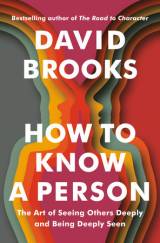In his new e book, The way to Know a Individual: The Artwork of Seeing Others Deeply and Being Seen Deeplycreator W The New York Occasions columnist David Brooks He writes a few interval of distinctive bonding between him and his younger son. The boy was simply over one yr previous and wakened each morning at 4 within the morning. As an alternative of placing him again in mattress, Brooks would be part of him on the ground for a number of hours and play. “I am naturally immature, and I beloved taking part in,” Brooks instructed me. He remembers these lengthy, wordless periods along with his son as a interval of deep tenderness and understanding, after they knew one another extra absolutely than anybody else. That is made doable by the pure bonding that comes with easy play.
 Just like the late British creator Iris Murdoch, Brooks believes that trying carefully at one other individual and searching for to grasp his or her place on this planet, as he and his son did a long time in the past, is the “elementary ethical act”—the perspective towards others that determines how we deal with others. The form of individuals we change into. However understanding the opposite is inherently tough; Selfishness, worry, distorted perception in our personal perspective, and different inner obstacles get in our means. Society’s “dehumanization” and slender give attention to tutorial benefit on the expense of character improvement, particularly amongst younger individuals, additionally conspire to erode ethical consciousness. Few know find out how to escape the prisons of their minds, and the social abilities that might assist us perceive one another — find out how to discuss, ask questions, disagree pretty, and think about one other’s perspective — are not often taught in faculties. Brooks wrote How are you aware the individual? To assist us develop these important abilities, a lot of which have change into rusty from underuse or eroded by crass social mores.
Just like the late British creator Iris Murdoch, Brooks believes that trying carefully at one other individual and searching for to grasp his or her place on this planet, as he and his son did a long time in the past, is the “elementary ethical act”—the perspective towards others that determines how we deal with others. The form of individuals we change into. However understanding the opposite is inherently tough; Selfishness, worry, distorted perception in our personal perspective, and different inner obstacles get in our means. Society’s “dehumanization” and slender give attention to tutorial benefit on the expense of character improvement, particularly amongst younger individuals, additionally conspire to erode ethical consciousness. Few know find out how to escape the prisons of their minds, and the social abilities that might assist us perceive one another — find out how to discuss, ask questions, disagree pretty, and think about one other’s perspective — are not often taught in faculties. Brooks wrote How are you aware the individual? To assist us develop these important abilities, a lot of which have change into rusty from underuse or eroded by crass social mores.
The problem is very essential for loving dad and mom who crave fixed communication with their kids. Brooks defined how the work concerned in understanding kids varies relying on their age and life circumstances. He instructed me: “The very first thing that flashes on a younger youngster is a glance, a glance of affection, a glance that claims: ‘I do know you, I see you.’ Taking part in aspect by aspect, with out agenda or aim, additionally generates natural belief and understanding. Though it’s simple In principle, however dad and mom (and everybody) are bombarded by distractions, particularly from their telephones. Brooks advises pondering of paying consideration as an off or on swap; when parenting a toddler, flip off TikTok or Instagram and have interaction absolutely. Striving to change into a “listener Loud” responds to a toddler’s tales and experiences with a vocal curiosity that additionally builds understanding. Brooks realized this himself by observing how Oprah Winfrey leans into her interviewees, gaps at them, affirms them, and visibly cares about them.
Mother and father would even be sensible to think about their kid’s life stage. That is particularly essential with youngsters, who’ve usually moved past what Brooks calls the early “imperial mission,” wherein they uncover their very own company, and have progressed to the “interpersonal mission,” wherein they acquire perception into their very own psychology—together with an intense, maddening eager for Typically they need to be appreciated by their friends. It’s suggested to attempt to see the world from their viewpoint. Invite mysterious teenagers to inform tales about what they are going by way of. Simply as they might with fellow adults, dad and mom could use conversational strategies that encourage openness: ask questions in regards to the kid’s distinctive pursuits, enable quiet back-and-forths, and repeat what the kid stated in your individual phrases. Remember that what usually results in generational division is the suspicion amongst younger folks that they aren’t revered.
Character sorts, for each dad and mom and kids, additionally affect communication. However few adults are conscious of the Huge 5 persona sorts—extrovert, conscientious, neurotic, agreeable, and extrovert—or perceive how these natures can battle. For instance, a demanding father who lacks acceptance could view his extremely delicate, neurotic son as a loud, crucial voice. A richer appreciation of those totally different persona sorts can assist dad and mom regulate their communication to swimsuit the kid.

